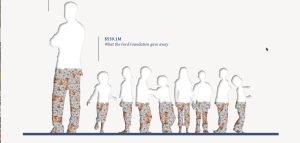March 2, 2016
Briefly
- From STAT news, a story about doctors who promote treatments on Twitter without disclosing significant conflicts of interest. “Simon said the extensive work he does for drug companies, including helping them develop drugs, would be too long to include as a disclosure in social media.”
(At the other extreme, Stephen Senn’s disclosure statement)
- This (good) Huffington Post story about good and bad ways to give away large sums of money has an.. um..unique graphic about halfway through

The bunch of children on the right represent donation by the Ford Foundation; the guy on the left represents payments to consultants. The blue and brown flowers are actually coins, and they surge up and down in the silhouettes in what must be intended to be a helpful way? (via @felixsalmon)
- Errors in data: in China, all the maps and GPS are wrong
- Overly-sensitive tests: assays for cocaine: a US drug labs was asked to develop a forensic test for cocaine on money that could be used as evidence against drug traffickers. The test worked, but it returned positive results on seven of 21 random samples of destroyed $50 notes removed from circulation.
- There was a widely circulated story (Guardian, Fusion) reporting a study that showed women on Github wrote better code but were less likely to have it accepted. The truth is more complicated: here’s one discussion including the key graph. (via Heather Piwowar)
- The Newmarket Business Association has released a poll on the flag referendum where they surveyed “Newmarket residents, commuters, and workers”. They found 40% support for the new flag, but didn’t explain why anyone would care about their particular sample.
Thomas Lumley (@tslumley) is Professor of Biostatistics at the University of Auckland. His research interests include semiparametric models, survey sampling, statistical computing, foundations of statistics, and whatever methodological problems his medical collaborators come up with. He also blogs at Biased and Inefficient See all posts by Thomas Lumley »